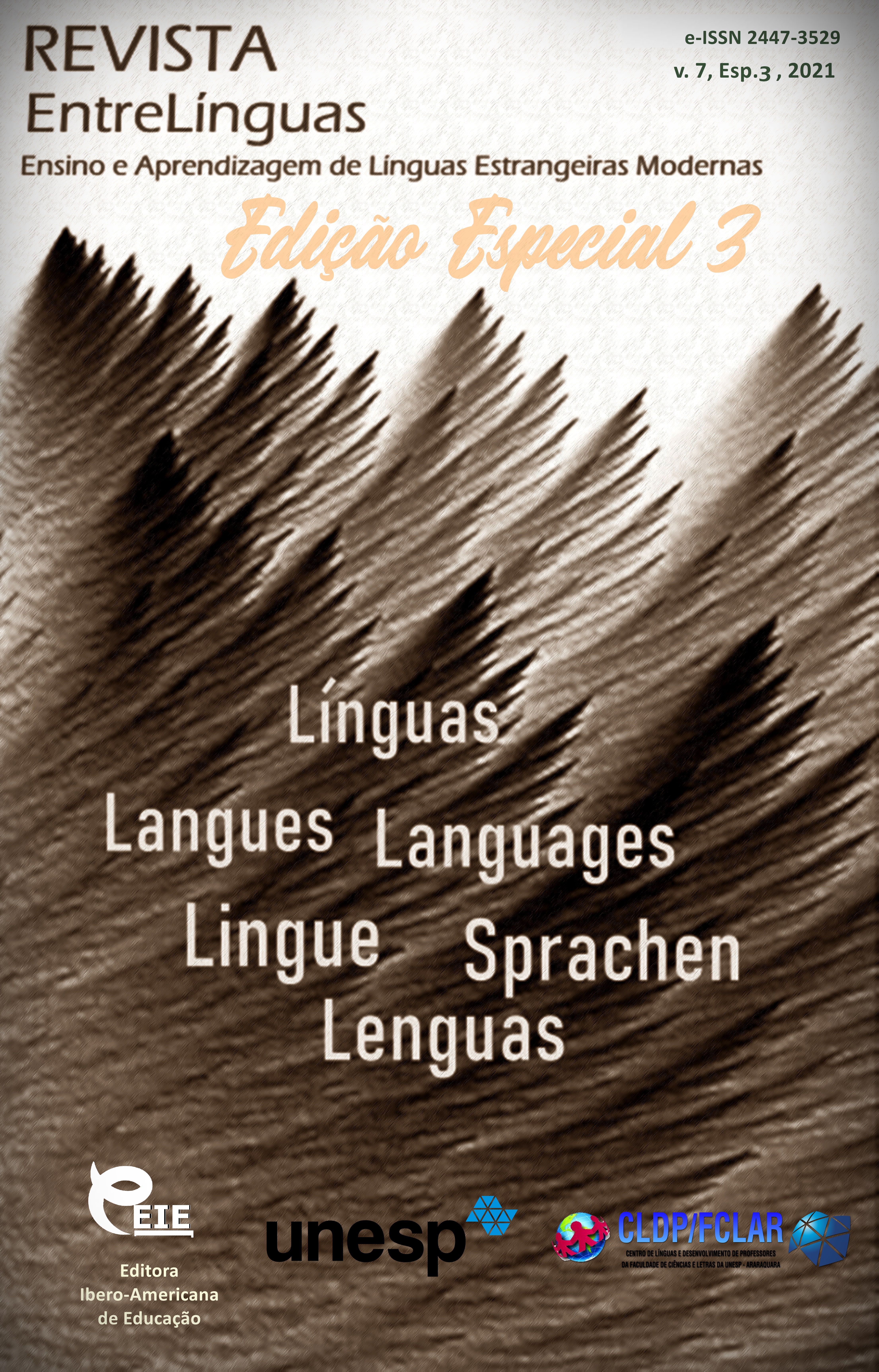Comparative analysis of wish forms on the example of tatar and english online publications
DOI:
https://doi.org/10.29051/el.v7iesp.3.15700Keywords:
Wish forms, Online publications, Tatar and english language, Congratulations, CelebrationsAbstract
This article is devoted to a comparative study of verbal means of communication as wish forms. They are an important category of speech etiquette, their significance in culture and in the life of society as a whole is undeniable. This is probably one of the few units of speech etiquette that can function in parallel with many other phenomena of speech etiquette, such as greetings, farewells, condolences, thanks, advice etc. The relevance of the topic is due to the growing interest of linguists in the problems of language and culture, the growth of intercultural relations, as well as the need to understand the place and role of verbal communication, as mutually reinforcing each other in one communicative situation, identifying their communicative-pragmatic features in typologically different structural languages, namely Tatar and English. An integrated approach to the study of verbal means of communication in the Tatar and English languages allows us to identify not only their language features, but also to show the national and cultural specifics of the Tatars and the British, to identify the similarities and differences between two completely different cultures. In this article, we decided to consider some of the most famous and common wishes such as Birthdays, Valentine's Day, Christmas, Ramadan, Kurban Bairam, as well as more specific local holidays like Saybantuy and Nauruz. The choice of this topic is not accidental since language learning and knowledge of the culture of the country under study should always go side by side. They are inextricably linked. Knowledge of the culture and traditions of the people give us the opportunity to better understand the language, since many words and expressions are a kind of reflection of their traditions. It is well known that the study of foreign languages begins with seemingly simple formulas as greetings, farewells, thanks and wishes. This topic, in our opinion, allows you to plunge deeper into the culture of the studied country. The best way to realize and understand the depth of the language is to compare it with your native language. Identify both similarities and differences. For a more accurate and in-depth analysis, we decided to consider examples from online sources. This choice as a source is not accidental, since today the Internet is the richest and most complete source of information, since it is there that you can find standard template greetings and postcards. However, in this work, we tried to consider not so much the template greetings used as a model, but the greetings of politicians, celebrities and editorial staff of online publications. Since, living language, in our opinion, is the most interesting and accurate source for comparing two genetically unrelated languages. After analyzing this material, we came to the conclusion that, first of all, the content of the wish is chosen by the speaker with an emphasis on the generally accepted system of values of the listener, his own ideas about what is bad and what is good for the addressee, whether the wish is pleasant or unpleasant to the addressee.
Downloads
References
AKHMETZYANOV, I. R.; MULLAGALIEV, N. K. To the issue of the comparative study of the tatar and english place names with the religious component. Kazan Linguistic Journal, v. 1, n. 3, p. 57-62, 2018.
GIMADEEVA, A. A et al. National and cultural peculiarities of the concept fear. Humanities & Social Sciences Reviews, v. 7, n. 4, p. 1237-1240, 2019.
KONDRATEVA, I.; SABIROVA, D.; PLOTNIKOVA, N. Subjectivity functions in reflexive and intercultural process of linguistic development. Cypriot Journal of Educational Sciences, v. 13, n. 4, p. 529-536, 2018.
MEKEKO, N. M. Sopostavitel'nyj analiz funkcionirovaniya edinic rechevogo etiketa tematicheskoj gruppy "Pozhelanie" v anglijskom i russkom yazykah: dissertaciya. kandidata filologicheskih nauk [Comparative analysis of the functioning of units of speech etiquette of the thematic group "Wish" in English and Russian]. 2001.
NURGALIEVA, L. A. et al. Productive ways of formation of chemical and biological terms (in English, Russian and Tatar languages). 3C TIC. Cuadernos de desarrollo aplicados a las TIC, p. 59-70, 2019.
NURTDINOVA, G. M; SADYKOVA, D. M. Semantic distance coefficient for semantic field religion of tatar culture-specific concepts and their equivalents in english. Journal of Social Sciences Research, v. 2018, n. esp. 1, p. 409-412, 2018.
SATTAROVA, A.; SABIROVA, D.; KONDRATEVA, I. The role of a woman in tatar cultural traditions revival. Opcion, v. 35, n. esp. 23, p. 345-359, 2019.
TATAR әdәbiyate [Tatar litrature]. 2005. 289 p.
VDOVINA, E. V. Pozdravlenie i pozhelanie v rechevom etikete: konceptual'nyj i kommunikativnyj analiz [Congratulations and wishes in speech etiquette: conceptual and communicative analysis]. 2001.
Published
How to Cite
Issue
Section
License

This work is licensed under a Creative Commons Attribution-NonCommercial-ShareAlike 4.0 International License.
Os manuscritos aceitos e publicados são de propriedade da Revista EntreLínguas. Os artigos publicados e as referências citadas na Revista EntreLínguas são de inteira responsabilidade de seus autores.
Transferência de direitos autorais – autorização para publicação
Caso o artigo submetido seja aprovado para publicação, já fica acordado que o(s) autor(es) autoriza(m) a UNESP a reproduzi-lo e publicá-lo na EntreLínguas, entendendo-se os termos “reprodução” e “publicação” conforme definição respectivamente dos incisos VI e I do artigo 5° da Lei 9610/98. O artigo poderá ser acessado pela rede mundial de computadores (Internet), sendo permitidas, a título gratuito, a consulta e a reprodução de exemplar do artigo para uso próprio de quem a consulta, desde que haja a citação ao texto consultado. Essa autorização de publicação 328 EntreLínguas, Araraquara, v. 1, n .2, p. 323-328, jul./dez. 2015 não tem limitação de tempo, ficando a UNESP responsável pela manutenção da identificação do(s) autor(es) do artigo. Os artigos publicados e as referências citadas na Revista EntreLínguas são de inteira responsabilidade de seus autores.











